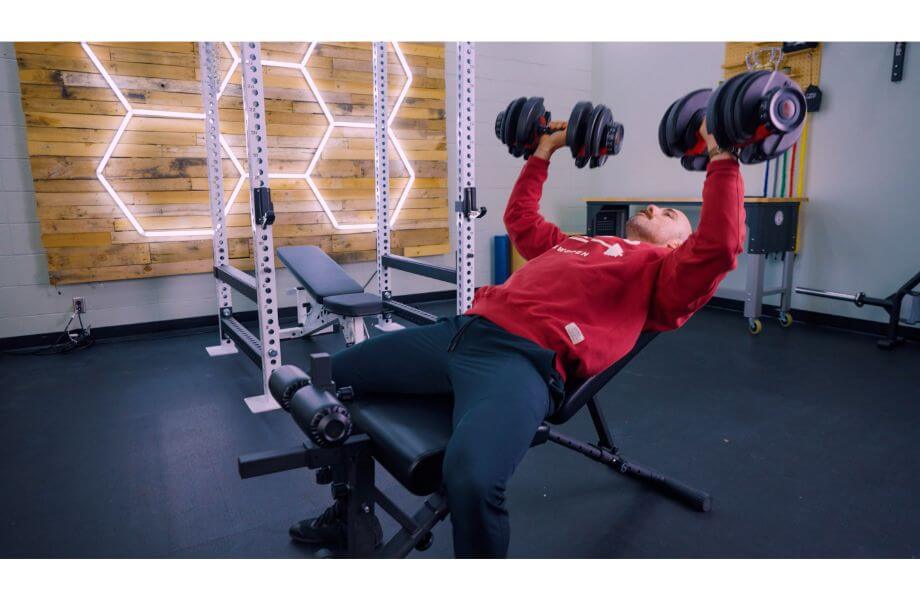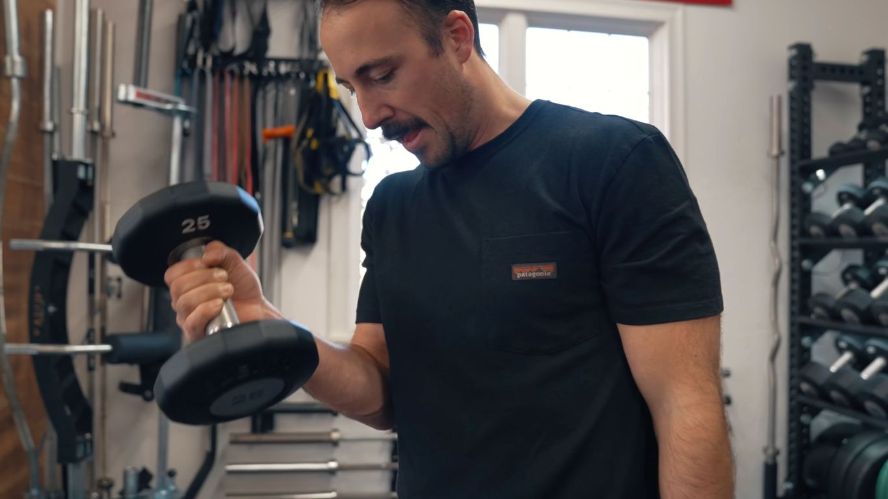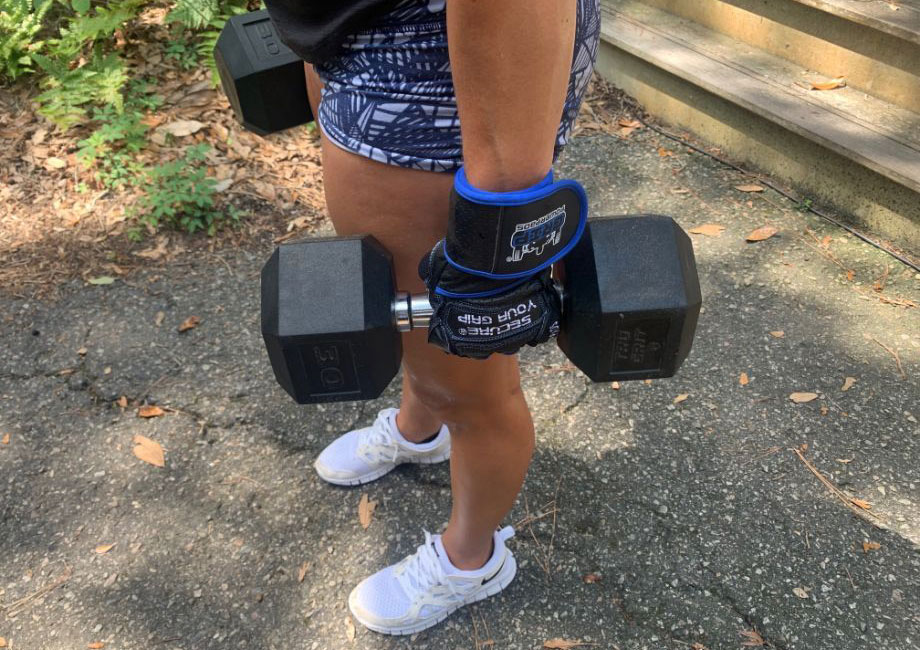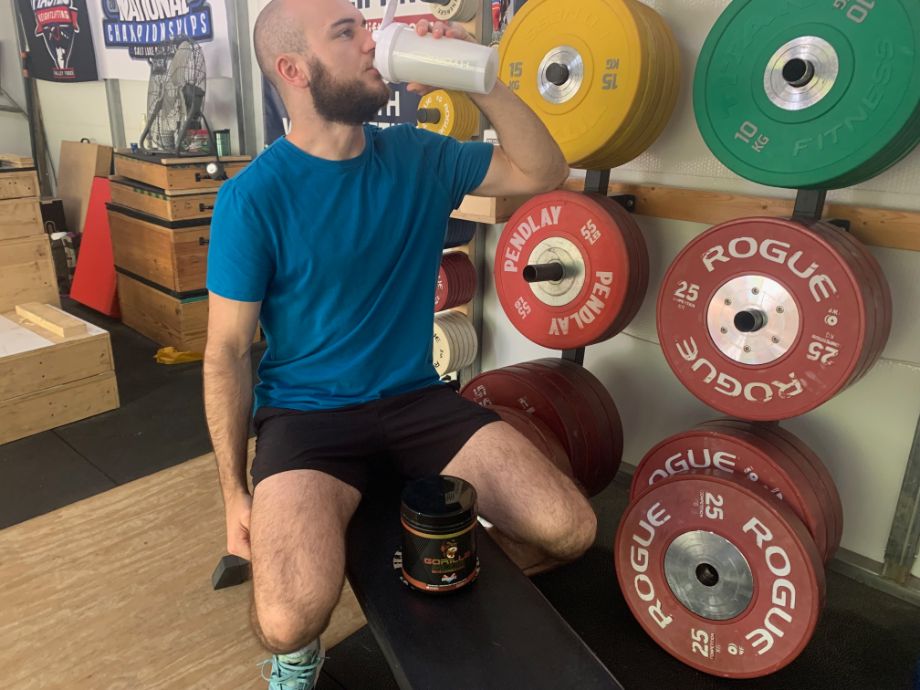Bodybuilders love their bicep curls, but nothing beats the pump you get from a great upper chest workout.
The upper chest muscles are one of the most distinctive features of a strong upper body, showcasing the musculature of the pectoralis major and creating that classic V-shape.
You can get plenty of muscle activation in the chest from regular chest exercises, including the bench press, chest press, dumbbell flyes, and cable crossovers, but adjusting these tried-and-true movements to increase the activation of the upper pecs helps target the area with more intensity and improve your results.
Are you ready for a workout that will seriously assist in your upper chest development?
We’ve picked out some of the best upper chest exercises and structured them in a way that will encourage strength gains, inspire hypertrophy, and become an all-around great addition to your overall chest training regimen.
RELATED: Low Chest Workouts: 8 Great Exercises
Chest Muscles Explained
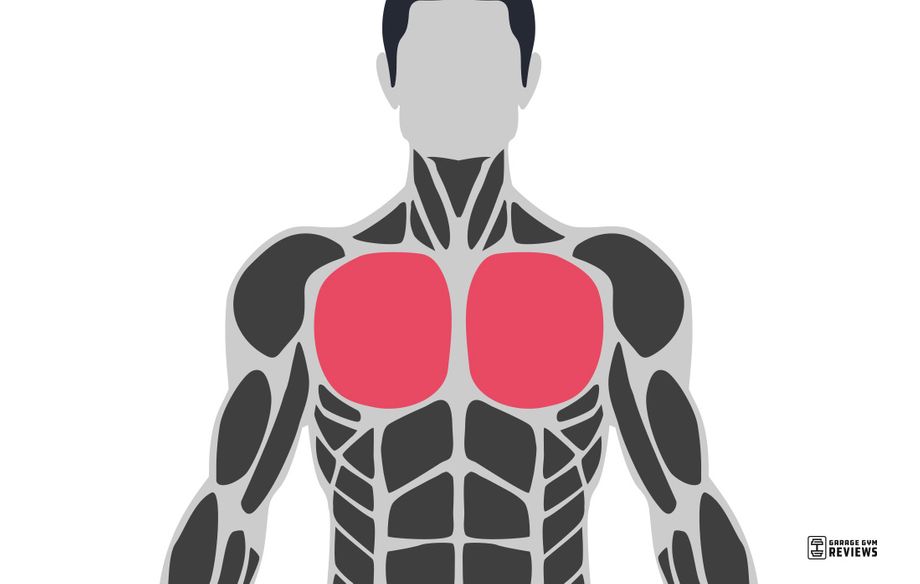
There are a few muscles in the chest, like the pectoralis minor, serratus anterior, and subclavius, but the pectoralis major, according to StatPearls1, “constitutes the bulk of the chest muscles.”
That’s going to be the main one you’re hitting in your run-of-the-mill chest exercises, with minor activation in the other chest muscles and adjacent muscles like the anterior deltoids and triceps brachii.
The pectoralis major2 is further broken down into two heads, the clavicular head and the sternal head, located in proximity to the clavicles and sternum respectively. Given this, our upper chest workout will predominantly work to target and build muscle by stimulating the clavicular head.
How to Target the Upper Chest Muscles
We already know what kinds of exercises will be used on a standard chest day at the gym. We’ve got our pushing movements, like the bench press, chest press, and push-up, and we’ve got our adduction movements, like the dumbbell fly, cable flyes, and cable crossovers.
So, how do we manipulate these common movements to make sure we’re placing a greater emphasis on the upper chest?
A 2020 study published in the International Journal of Environment Research and Public Health3 tested the activation of the pectoralis major at five different inclinations. Researchers concluded that “an inclination of 30° produces greater activation of the upper portion of the pectoralis major,” while “inclinations greater than 45° produce significantly higher activation of the anterior deltoid and decrease the muscular performance of the pectoralis major.”
Based on these findings, we want movements that keep us in that sweet spot of 30-degree incline. That means swapping out our flat bench press for an incline bench press instead. It means taking our regular push-ups and performing them at a decline to simulate that same angle.
We’re not only focusing on the angle of the exercise performed; we’re going to pay special attention to our grip width as well.
A 2022 study published in the Journal of Strength and Conditioning Research4 studied various aspects of the bench press exercise, including “how changes in grip width and elbow positioning affected…muscle activity of the primary movers.”
The study determined that “a decrease in grip width induced…larger EMG activity of the lateral head of the triceps brachii, anterior deltoid, and clavicular head of the pectoralis major.”
Let’s recap.
- We’re using a combination of pushing movements and adduction movements to target our chest, as well as our triceps and front delts
- We’re performing them at approximately a 30-degree incline to focus our upper chest without shifting the emphasis onto the anterior deltoids
- We’re using a more narrow grip, as this produces higher EMG activity in the upper chest than wide grip
Got it? Good. Now, onto the workout!
RELATED: Try This Chest and Tricep Workout
Upper Chest Workout
Our upper chest workout kicks off with three straight sets, starting conservatively and progressively getting heavier with each set. After the straight sets, we move onto our supersets, swapping out the heavy weights for light weights so we can cycle reps efficiently.
We’ve posted our recommended rest intervals, but, for the beginners in the audience, please don’t be afraid to take extra rest if you need it. It’s always more important that you’re able to tackle each exercise with proper form than to rush through and let fatigue cause you to cut corners.
Part 1: Incline Bench Press
Benefits: Taking your flat bench press and incorporating about 30-degrees of incline shifts the focus from the pectoralis major as a whole to its clavicular head instead, leading to muscle growth in the upper chest.
Primary mover: Pectoralis major, triceps brachii, anterior deltoids
Sets/reps and RPE: 5 sets of 5 reps. First working set 65-70% of 1-rep max; work up to 85% of 1RM
Rest interval: 90 to 120 seconds between sets
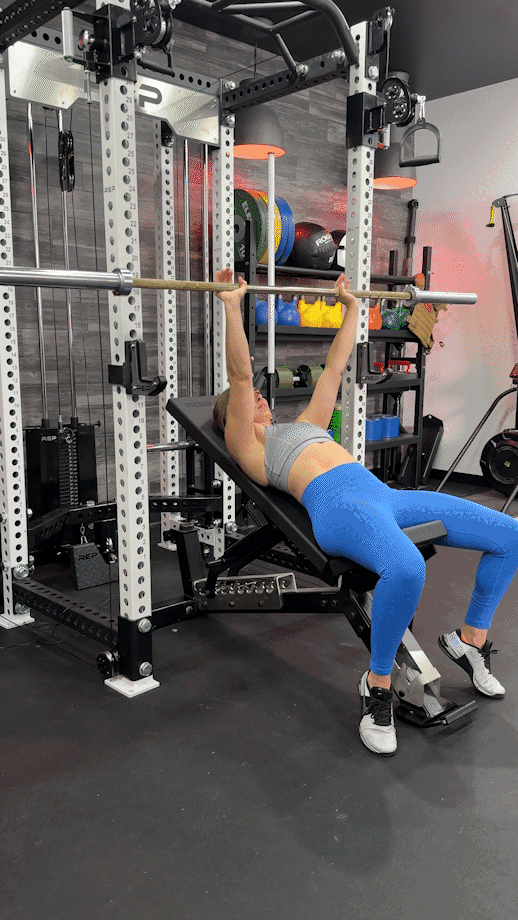
Part 2: Incline Dumbbell Press
Benefits: Using a pair of dumbbells increases the range of motion of your standard dumbbell bench press. It also opens the door for using a neutral grip, as in your palms facing each other, as this positioning reduces stress on the shoulder joint.
Primary mover: Pectoralis major, triceps brachii, anterior deltoids
Sets/reps and RPE: 5 sets of 5 reps. First working set 65-70% of 1-rep max; work up to 85% of 1RM
Rest interval: 90 to 120 seconds between sets
RELATED: The Best Dumbbells
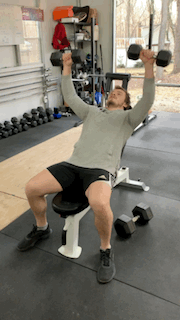
Part 3: Close-Grip Bench Press
Benefits: Studies show4 that a closer grip, or a grip that is more narrow than your standard shoulder-width starting position, increases the upper chest activation during the bench press.
Primary mover: Pectoralis major, triceps brachii, anterior deltoids
Sets/reps and RPE: 5 sets of 5 reps. First working set 65-70% of 1-rep max; work up to 85% of 1RM
Rest interval: 90 to 120 seconds between sets
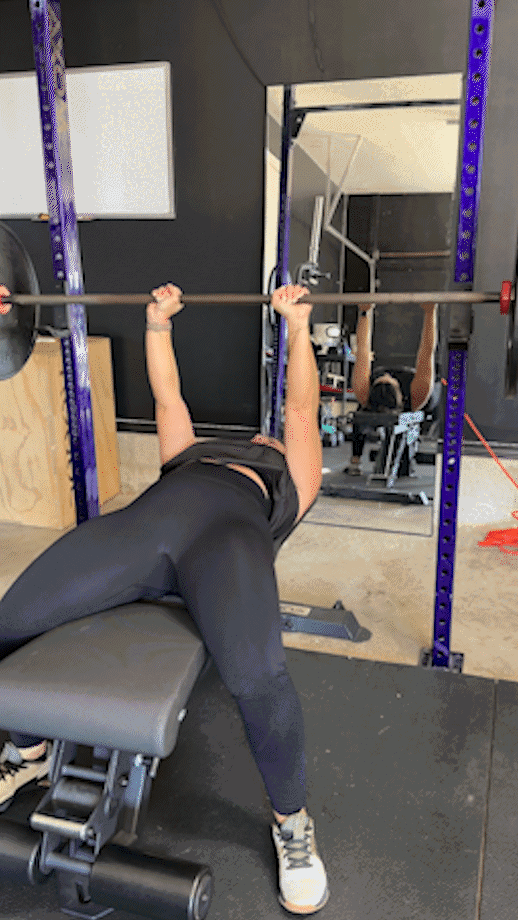
Part 4: Superset, Decline Push-Ups and Low-to-High Cable Fly
Benefits: A decline push-up is kind of like an incline bench press flipped upside down that uses your bodyweight instead of free weights. The low-to-high cable fly, on the other hand, is one of the best chest isolation exercises out there.
Primary mover: Pectoralis major, triceps brachii, anterior deltoids
Sets/reps and RPE: 3 sets of 10 reps at 65-70%
Rest interval: 90 to 120 seconds between sets
RELATED: What Muscles Do Push-Ups Work?
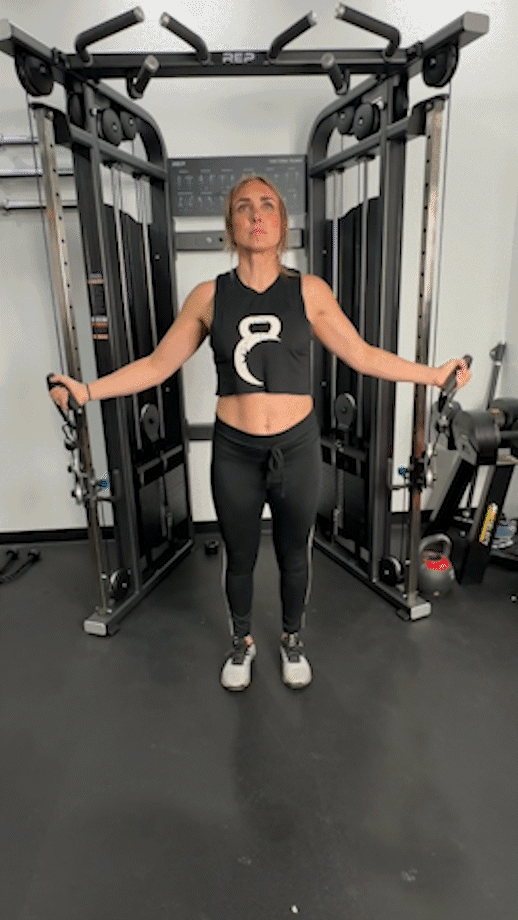
Part 5: Superset, Triceps Dip and Dumbbell Chest Fly
Benefits: The triceps dip is not only a great exercise for your upper arm, but for the chest muscles as well. Coupling it with the dumbbell chest fly, an adduction movement, hits the same muscle groups but in unique ways that complement each other well.
Primary mover: Pectoralis major, triceps brachii, anterior deltoids
Sets/reps and RPE: 3 sets of 10 reps at 65-70%
Rest interval: 90 to 120 seconds between sets
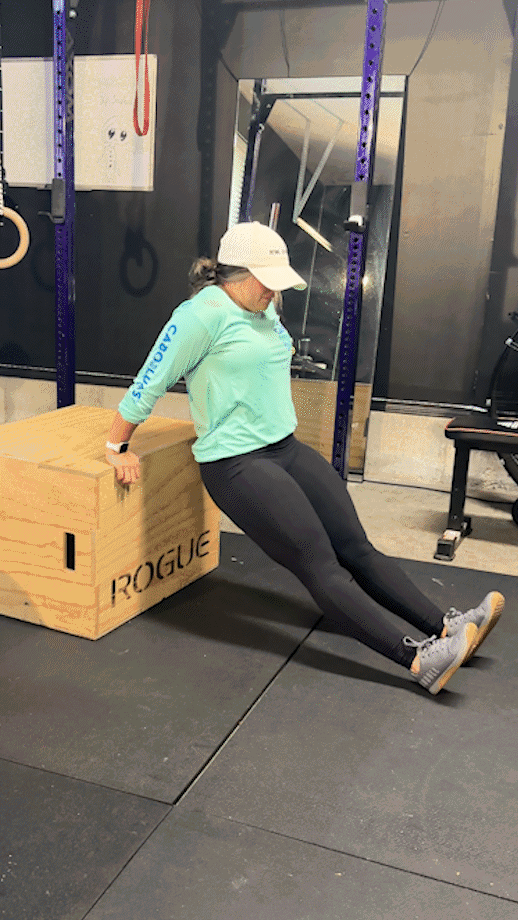
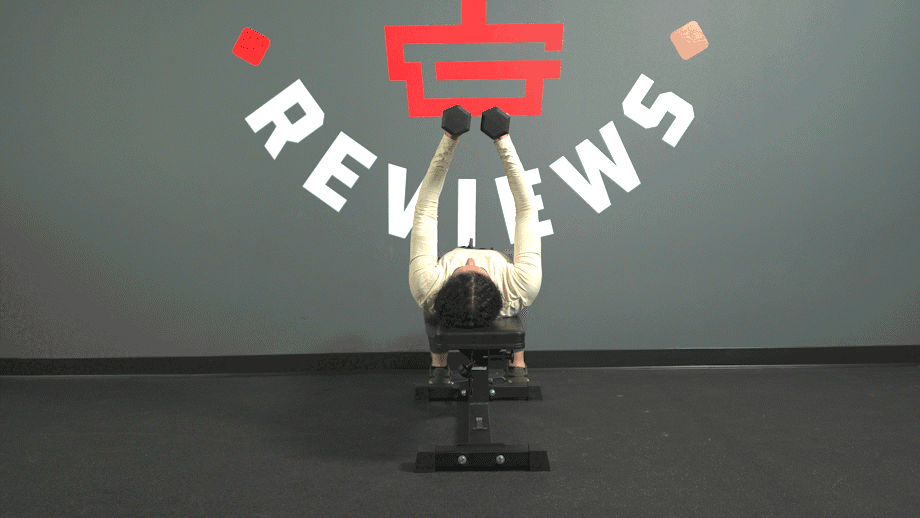
FAQs: Upper Chest Workout
How do you isolate the upper chest muscles?
The pectoralis major, aka the major muscle of your chest, includes the sternal head, located in your lower chest, and the clavicular head, located in the upper chest. For optimal upper chest development, we want to isolate the upper chest muscles as best we can.
To do that, we’ll want to focus on exercises that involve approximately a 30-degree angle of incline, like the incline bench press or decline push-up. We’ll also want to use a more narrow grip on lifts like the flat bench press to shift the focus to the upper chest as well.
How many times per week should you work chest?
A 2017 study published in Muscle & Nerve5 determined that the pectoralis major and triceps brachii were capable of producing “peak torque values” approximately 48 hours after training.
Given this, we recommend waiting at least forty-eight hours in between chest training sessions so your damaged muscle fibers can fully recover.
That translates to about two to three sessions weekly.
Should you combine chest and tri workouts?
Absolutely. It’s effective and time-efficient to combine your chest and triceps workouts. That’s because they form what is called a synergistic pair, or two muscle groups that work together to perform a single movement, exercise, or lift.
Most chest exercises involve pushing, pressing, or otherwise extending the elbow to straighten your arm. The muscles of your chest are recruited during these movements, helping you produce the force required to get the job done, but you’ll also feel it in your upper arms, too!
Unless you’re exclusively performing chest isolation exercises on chest day, you’re likely already performing a plethora of compound exercises that provide activation in the chest, triceps, and other adjacent muscle groups.
So, you might as well combine them and get the most bang for your buck!
RELATED: The Best Tricep Exercises
References
- 1. Baig MA, Bordoni B. Anatomy, Shoulder and Upper Limb, Pectoral Muscles. [Updated 2022 Aug 30]. In: StatPearls [Internet]. Treasure Island (FL): StatPearls Publishing; 2023 Jan
- 2. Solari F, Burns B. Anatomy, Thorax, Pectoralis Major Major. [Updated 2022 Jul 25]. In: StatPearls [Internet]. Treasure Island (FL): StatPearls Publishing; 2023 Jan
- 3. Rodríguez-Ridao D, Antequera-Vique JA, Martín-Fuentes I, Muyor JM. Effect of Five Bench Inclinations on the Electromyographic Activity of the Pectoralis Major, Anterior Deltoid, and Triceps Brachii during the Bench Press Exercise. Int J Environ Res Public Health. 2020;17(19):7339. Published 2020 Oct 8. doi:10.3390/ijerph17197339
- 4. Mausehund L, Werkhausen A, Bartsch J, Krosshaug T. Understanding Bench Press Biomechanics-The Necessity of Measuring Lateral Barbell Forces. J Strength Cond Res. 2022;36(10):2685-2695. doi:10.1519/JSC.0000000000003948
- 5. Ferreira DV, Gentil P, Soares SRS, Bottaro M. Recovery of pectoralis major and triceps brachii after bench press exercise. Muscle Nerve. 2017;56(5):963-967. doi:10.1002/mus.25541


